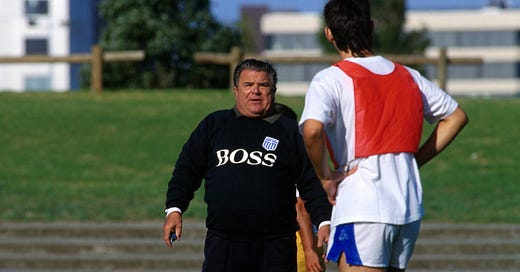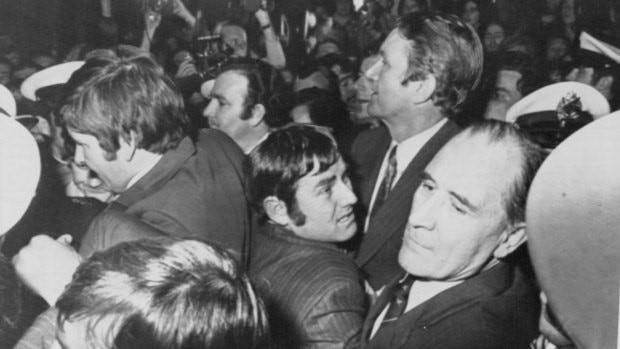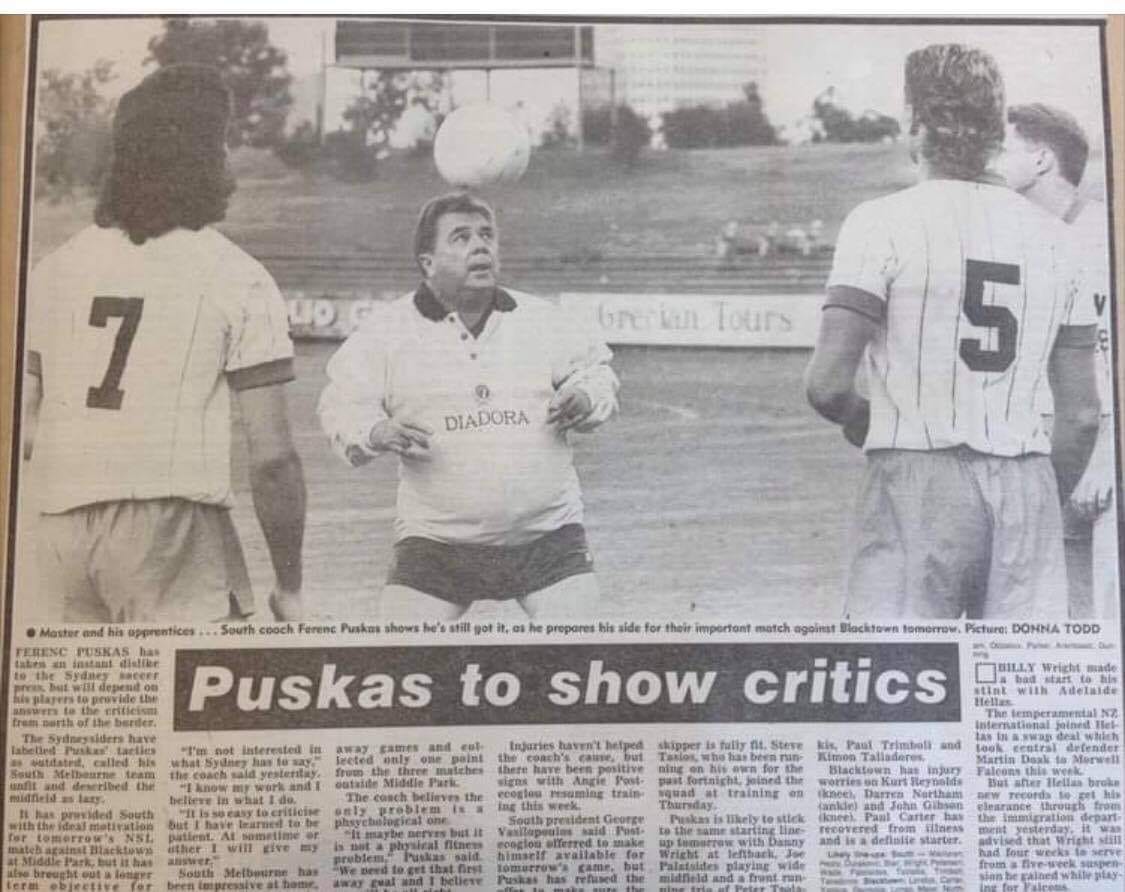The weight of the archive — how broadcasters have killed Australian filmmaking
Our film Puskas in Australia (trailer below) has laboured under the weight of an uncleared copyright archive for several years. We are not alone, as a story in the weekend papers demonstrated.
A filmmaker named Gary Newman wrote an article for Fairfax on the weekend that spoke to every person who has tried to make an archival film in this country. He called it, ‘How the ABC’s Gollum grip is killing Australian stories’ and it’s about the horrendous cost of the ABC’s archive ($88 per second), the treasure trove of audio and video that sits part digitised, part strewn out across storage facilities, that I imagine as something akin to the final shot in Raiders of the Lost Ark.
Long term readers of Good one, Wilson would know that I’ve been trying to make our second sporting archival film for nearly seven years now. It’s about Hungarian football legend, Ferenc Puskás, whose last stop in a storied football life was to coach South Melbourne Hellas to the NSL championship in 1991/2. His captain was Ange Postecoglou, now manager of Tottenham, and muse to Robbie Williams, and roaring up the charts as one of the great football stories in the last fifty years himself.
We finished the film, we’ve had rave ‘preview reviews’ from respected UK columnists in The Guardian and The Times, we’ve shown it to South Melbourne insiders and Melbourne Hungarian community members and had them shedding tears and in fits of laughter. We’ve pitched it to people who might be willing to make tax deductible donations through the Documentary Australia Fund, and 79 generous fans of either the three of us or sports history films with a Greek Hungarian flavour have made donations.
But we are still at the bottom of the mountain of license fees that exist for this documentary.
They are mostly owed to the ABC, as it was the host broadcaster during those Puskas years. We have 1278 seconds of ABC footage at retail rate of $80/second, but with a bulk discount offered at $63/second. So the discounted amount is $80,514. I’ve wondered how much the ABC paid for the NSL rights in 1991-2, and doubt very much it would have been $80,000. So for a bunch of games they paid virtually nothing, they get a payday in 2024 from three saps with no funding slaving away for free in the suburbs of Melbourne, who thought they wanted to tell a sports history story, because they wanted the story to be preserved.
And let’s face it, the broadcasters don’t have a great track record at recognising history, even as it’s being broadcast. Comedian and comedy history buff Tony Martin often relates the archival atrocities committed against Pete and Dud’s ‘Not Only... But Also...", which was erased by the BBC under their policy of wiping master videotapes for reuse. Only eight of the original twenty-two episodes survive complete. A fan in New Zealand became a hero twenty years ago when he uncovered a ‘new’ episode on a cannister of film in his garage. He’d videoed his television, and that’s the best we have of that episode.
We owe SBS about $12,500 for our 3 minutes of footage, and I suspect they will charge us the full (bulk discounted) rate of $80 per second despite the fact that most of SBS footage has been sourced from YouTube, preserved by South Melbourne fans like Paul Mavroudis, who pressed play on his VCR back in the 80s, and that’s now the sole remaining copy. SBS are looking in their Raiders of the Lost Ark vaults, but I’m not holding my breath. We might get lucky and find the high resolution tapes. Even if we don’t, it doesn’t matter that Paul taped their material, preserved the history, SBS puts its hand out as the copyright owner. Paul doesn’t get paid a cent. (he will be getting a credit with us).
We’re so grateful to archive owners who have been generous towards us. The Pirchan family and Andrew Pirchan in particular have donated some beautiful handheld footage of Middle Park ground on the last ever matchday in 1994, and it gives us the perfect look and mood for what this sanctuary meant to Greek Australians. Parkmore /Kek Duna FC (now called Keysborough District FC) shot the most incredible footage of a portly, sixty-something Ferenc Puskas smoking half volleys into the top corner of goals on dusty fields in Keysborough, and their president Sandor Rind not only translated the Hungarian into English for us, he donated the footage.
FIFA, by contrast, say you can’t take less than a minute of FIFA footage. And the cost is … US$25,000 per minute for worldwide rights in perpetuity. We only need 20 seconds of FIFA, so that jets in at A$1700 per second. We either ditch the excellent footage of Idris Elba standing in front of Messi and Ronaldo at the FIFA Awards, announcing ‘Fenrik’ (sic) Puskas’s award, or we find a way. One filmmaker has told us that for her Matildas doco, she did a deal where FIFA+ could stream the film for free, in return for donating the archive. We may go down this road too, if they’ll have us.
This is the archival world we live in. If you sniff it even for a second you’ll be telling your kids to drop out of uni and just walk around the city filming and cataloguing. Their ship will come in in fifty years! Whatever you do, don’t let them make an archival film, or certainly not one that hasn’t been prefunded. It’s a nightmare. The $200,000 price-tag on Puskas in Australia’s archive has exerted so much pressure on us as a filmmaking team. This thing has been practically finished in a creative sense for years. For the generous people who have donated, we will find a way to get it shown somewhere, but we are looking into how much a film festival only release will cost, abandoning cinemas, streaming, and internet sales.
Anyway, like I said, don’t make films. The world is set up for bean counters and bureaucrats. Below, I’ll copy Gary Newman’s article, because he says it better than me. On a personal note, I want to thank Janine, the ABC rights librarian, who charges the rates she has to charge, who has been immeasurably helpful, and who has been good enough to donate to our crowdfunding personally.
She is not part of ABC Corporate.
How ABC greed is killing Australian stories
By Gary Newman, Sydney Morning Herald, February 21st, 2024
The ABC was a staple in my outer ’burbs childhood home. I have fond memories of Big Ted and the sound of my father’s piercing “shoossssh!” if we dared interrupt the 7pm news with Mary Delahunty. But my fondness for the ABC has waned.
The ABC has near monopoly status when it comes to Australian documentary programs, but its practices have slowly strangled our documentary sector to death.
Until the late 1990s, the ABC had a popular weekly primetime slot featuring Australian documentaries made by independent filmmakers. Now the national broadcaster favours formulaic presenter-led factual entertainment made by large production enterprises.
In the “Uniquely Australian” documentary category on ABC iView you’ll find Bill Bailey’s Wild West Australia, in which the British celebrity travels around the outback or Australia’s Open, which bears closer resemblance to a promotional film for the tennis event than a documentary. Elsewhere, you’ll find Grand Designs Transformations, an Australian take on a British concept that the ABC calls “formatted observational documentary”.
These shows have a place, but they are increasingly displacing independent Australian documentaries. And on the odd occasion such films are acquired by the ABC, the amount offered is so low that it’s been known for a producer to walk away rather than suffer the indignity after spending years making their film.
Daryl Dellora – director of the popular Search for the Palace Letters doco recently aired on the ABC – struggled for many years to finance the film. Dellora says he and producer Sue Maslin are significantly out of pocket after Screen Australia passed on his film.
In the end, the ABC purchased the film for $20,000, a fraction of the $350,000 spent on the four-year project. Dellora says he simply can’t afford to go through that again. He thinks his documentary career is over.
I have also been on the wrong end of the ABC’s practices. After failing to attract funding from the ABC and Screen Australia, I put my own money on the line for my feature documentary How to Capture a Prime Minister – about the wild time in 1976 when then prime minister Malcolm Fraser was trapped in a basement by angry students in the aftermath of the Whitlam government’s dismissal.
The ABC asked me to pay more than $80,000 for the historical footage used in the doco, even though I’m never going to fully recover the six-figure sum I’ve spent on my film. This is for footage that has already been paid for by the Australian public.
The national broadcaster collects hundreds of minutes of unedited news footage per day, ranging from political speeches and interviews, to vignettes of metropolitan and rural life. Multiply that by decades and you get a sense of how rich this audiovisual history of our country really is.
But the ABC covets this historical material like Tolkien’s Golem, price gouging anyone who wants to use any of it. It’s telling that the business unit responsible for footage licensing is called ABC Commercial.
The ABC’s archive is “a national treasure belonging to the citizens of Australia who paid for its creation”, says Associate Professor Tony Moore, a media and communications academic at Monash University. “The excessive access fees charged to students and scholars, and the high licence fees charged to independent documentary makers effectively locks this treasure away.”
Today, the ABC charges up to $88 per second for the use of archival footage.
This leaves many documentary makers trying to squeeze money from Screen Australia, a government body, just to pay the ABC, another government body. Filmmakers who sell their work to the ABC often end up owing the national broadcaster money because archival fees typically exceed the amount paid for the film.
Australians say they’re hungry for more Australian stories – and there are many to tell. But the ABC makes it difficult to unearth the diverse voices governments say they want to hear more of. Archival fees for independent producers should be waived until the project at least achieves a healthy profit, and fees for academic research should be eliminated or significantly discounted, especially for postgraduate students.
I do have some empathy for the ABC. Like many government-funded institutions it has endured millions of dollars of cuts while being encouraged to make up the difference by commercialising. And to its credit, the Albanese government has provided additional funding. But the issues remain.
I don’t believe our national history should be locked away behind a paywall, so I’ve built a streaming platform into my film’s website so Australians can watch How to Capture a Prime Minister for free. Hopefully, the national broadcaster won’t sue me for using their footage without paying.
Many filmmakers are afraid to speak out for fear of being blackballed. Or they are forced to give up. Screen Australia analysis suggests up to 61 per cent of Australian documentary directors don’t make a second film.
I’m inclined to join their ranks.
Gary Newman is a Melbourne-based filmmaker, journalist and communications specialist.










Good grief, Tony. I had no idea; that is just beyond belief. I hope you manage to find a workaround, or a benefactor, somehow.